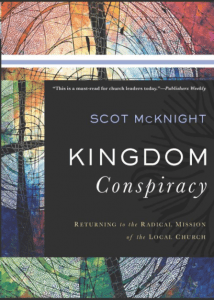 In a recent exchange between Tim Dalrymple (here, here, here) and Owen Strachan (here) we observed that each author had a different viewpoint but that each was operating within a similar framework for understanding how the Christian relates to the State. Briefly, Dalrymple wondered aloud if it was time for Christians to spend their public, political efforts on something other than fighting same-sex marriages and civil unions without surrendering his/their adherence to a biblical ethic, while Strachan struck the battle cry for all out culture war, saw Dalrymple as caving in on the battle the Christian must wage because of the biblical ethic. Both are committed to a kind of Niebhurian Type 5 approach to the Christian’s relationship to the State — namely, the Reformed strategy of influencing, politicking, agitating, and striving for a biblical ethic to reach as far as it can. God’s will is God’s will for everything.
In a recent exchange between Tim Dalrymple (here, here, here) and Owen Strachan (here) we observed that each author had a different viewpoint but that each was operating within a similar framework for understanding how the Christian relates to the State. Briefly, Dalrymple wondered aloud if it was time for Christians to spend their public, political efforts on something other than fighting same-sex marriages and civil unions without surrendering his/their adherence to a biblical ethic, while Strachan struck the battle cry for all out culture war, saw Dalrymple as caving in on the battle the Christian must wage because of the biblical ethic. Both are committed to a kind of Niebhurian Type 5 approach to the Christian’s relationship to the State — namely, the Reformed strategy of influencing, politicking, agitating, and striving for a biblical ethic to reach as far as it can. God’s will is God’s will for everything.
These two do not differ, then, on what is right or what is wrong but on how best for the Christian to be Christian in the world and in the State and in culture. Dalrymple surprised me because the culture war approach seems inevitable for Type 5 thinkers, even if James Davison Hunter’s To Change the World proposed a meeker and milder and quieter form of the Reformed approach. I saw Dalrymple taking a more Hunter-ian approach while Strachan was taking the aggressive Moral Majority approach.
Why are so many Christians concerned with justifying war and not so much with reconciliation? What do you think of Stassen’s peacemaking initiatives? Will they work inside the walls of churches with “warring parties”?
Glen Stassen’s A Thicker Jesus might be seen as yet another approach. Yes, Stassen is a social ethicist, a Christian social ethicist, and that means he wants to translate — in true Niebuhrian form — Christian ethics into public ethics and provide a public rationale for a Christian ethic. But he’s more to the left while Dalrymple and Strachan are on the right.
Instead of engaging these three similar-but-different approaches to engaging public ethics, I want here simply to register an observation and then sketch how Stassen takes a “thicker-Jesus” approach from his teachings in the Sermon on the Mount into the discussion about war and just peacemaking. All three of these approaches are to be compared to a more ecclesial (Type 1 in Niebuhr, though his sketch is wildly imbalanced) approach, one in which the church is the focal energies of one’s “public” concerns, one in which political action is indirectly done through forming an alternative politic in the church, and one in which the culture war is 100% avoided. More directly, each of these approaches needs to state more clearly how the church functions in one’s political theology.
Stassen, I suspect, differs dramatically with Dalrymple and Strachan when it comes to war. Stassen thinks Jesus’ words mean business, they mean business for every followers, and they therefore mean business for the Christian’s views about the best kind of public politic. He doesn’t think Jesus’ teachings on peace and non-retaliation are too idealistic but they are kingdom ethics for a this-worldly existence. His approach seeks to show that Jesus is Lord over all (including the politics of war), realistic (it works), and transcends ideologies.
The bottom line is this: too many Christians want to win; they are not focused enough on peace, justice, love, wisdom, and reconciliation. They want the right way to win. The culture war approach is about winning. It’s a losing strategy.
He finds a politics of just peacemaking, rooted in his “thicker Jesus,” in ten practices, and you can see how he uses his strategy of “analogical contextualization” — through imaginative recreation of the teachings of Jesus — to work these out:
Initiatives
1. Support nonviolent direction act (Matt 5:38-43)
2. Take independent initiatives (5:38-43): these two combined reduce threats to both sides.
3. Use cooperative conflict resolution (5:21-26)
4. Acknowledge responsibility for conflict and injustice and seek repentance and forgiveness (7:1-5)
Justice (6:19-33)
5. Advance human rights, religious liberty, and democracy.
6. Support economic development that is sustainable and just.
Include enemies in the community of neighbors (5:38-43)
7. Work with emerging cooperative networks in the international system.
8. Strengthen the United Nations and international efforts for human rights.
9. Reduce offensive weapons and weapons trade (26:52)
10. Participate in grassroots peacemaking groups (as Jesus and the disciples formed groups, and so spread the gospel)
In #10 I believe Stassen gets to the heart of the approach of Jesus; he did not seek to win Rome or Judea’s leaders. Instead, he formed alternative kingdom communities, in which communities reconciliation, forgiveness, etc, were practiced, and offered to others an alternative, real kingdom approach to politics.











